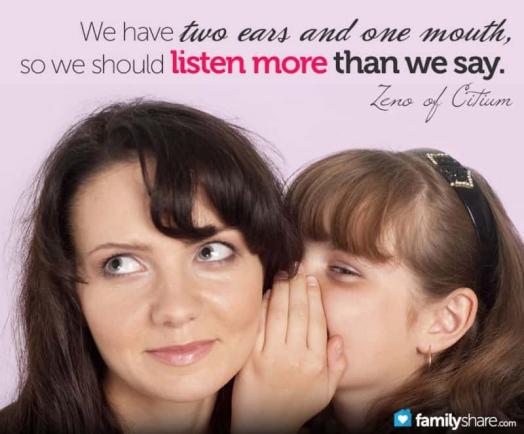
If asked if they are better listeners than their kids, many parents will quickly answer, "Of course, I am." After all, we are smarter, more mature and do things better than our kids. So naturally we are the better listeners.
Really? Not so fast!
That very position of superiority can hinder us from not only listening, but understanding our children. We make decisions based on our own wisdom and experience, without input from the very child it will affect. After all, we know best. End of conversation.
I believe children tend to be better listeners because they have more of an investment in the information they hear. You may be thinking, "What? My kids never listen to what I say. They ignore me and I have to repeat myself a hundred times." Oh, they most likely heard you the first time. They just chose not to respond because it wasn't beneficial to them.
"Clean up your room," isn't motivating.
"Turn off the TV," isn't what they want to do.
But have a quiet conversation with your spouse in a room separate from your teen about something that will critically affect them and, amazingly, they hear you. The expression is true: "Little pitchers have big ears."
Parents are too busy giving orders, multitasking and expecting unchallenged compliance from their children. I believe that makes us bad listeners. And we set a bad example for our children to follow. As James A. Baldwin said, "Children have never been very good at listening to their elders, but they have never failed to imitate them."
I suggest we work on intentional listening instead. One way we can be intentional is through empathetic listening.
Empathetic listening
Empathy is to put yourself in the place of another person and understand their feelings. As parents, we can listen empathetically when we:
-
Don't judge.
-
Don't demand agreement.
-
Don't rush to fix the problem.
Instead, we are:
-
Present.
-
Mindful.
-
Aware of what our child is saying.
Here are three common statements by children and contrasting responses by parents:
1. Child statement
"I hate Shelly. She is so mean!"
Typical parent response
"You don't hate her. She's a nice girl."
Empathetic listening and response
"Wow! You sound upset. What happened?"
2. Child Statement
"I don't want to go to school."
Typical parent response
"Well you don't have a choice now, do you? The bus will be here soon."
Empathetic listening and response
"School can be hard sometimes. What's going on?"
3. Child Statement
"I can't clean my room. It's too hard!"
Typical parent response
"What is hard is when you get grounded for not cleaning it. So march!"
Empathetic listening and response
"You're right. That's a super messy place. I'd be overwhelmed too, if that was my room. What could make it less hard?"
Notice the typical parent responses want unquestioned compliance and to give orders. The second examples show a parent who sees beyond the emotion and listens empathetically.
Follow up questions
Follow up with intentional "Who, what, how and why," questions to get more information. They help the child to feel understood. When we do that, solutions seem to naturally follow.
Conscious listening opens the door to understanding. So if you want to be a better listener, be intentional and listen empathetically. Seek to understand. Here is a review of the do's and don'ts:
Don't judge, demand or rush to fixthe problem.
Do be present, mindful and awareof the feelings your child expresses.

